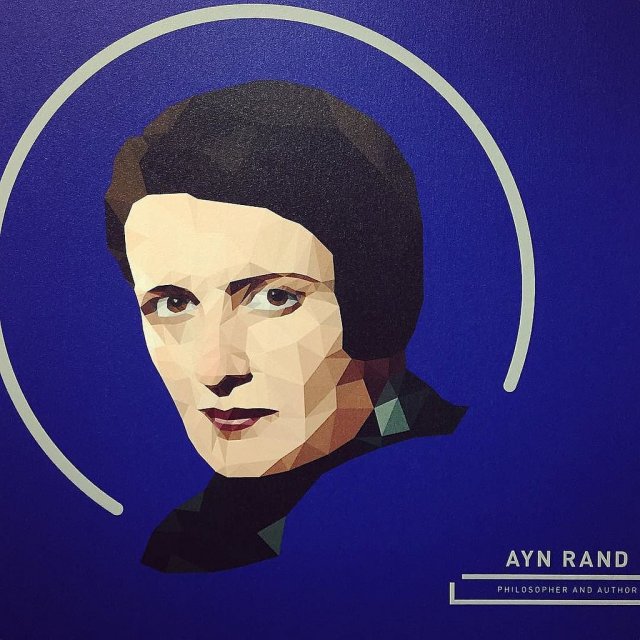
Consider the following scenario:
Fleeing the clutches of an oppressive regime, a young woman emigrates to 1920s America. She struggles at first, but through sheer guts and determination, she establishes herself as one of the most famous intellectuals of the 20th century. A true original, she founds her own highly distinctive school of philosophy – as set out in a sequence of books that sell in their millions.
Decades after her death, her most famous works are still best sellers – and continue to exert an influence at the highest levels of politics and business.
And yet, today, academia all but ignores her – dismissing her philosophy and mocking her literary output. You’d think the woke left would be furious. How dare the patriarchal establishment ignore someone who ticks all the boxes: a woman, a refugee, a non-Christian (indeed, an outspoken atheist)!
So where are the campus protests? Where are the mobs of angry students with blue hair and nose rings?
This answer is nowhere, because the woman in question is a non-approved woman – in fact, she’s none other than Ayn Rand.
There are all sort of good reasons for disagreeing with Rand; but, as Skye C Cleary argues in an article for Aeon magazine, ignoring her won’t make her ideas go away:
“Philosophers love to hate Ayn Rand. It’s trendy to scoff at any mention of her. One philosopher told me that: ‘No one needs to be exposed to that monster.’ Many propose that she’s not a philosopher at all and should not be taken seriously. The problem is that people are taking her seriously. In some cases, very seriously.”
What is so monstrous about Randian thought (or Objectivism to give her philosophy its proper name)? Did Ayn Rand have Fascist or Communist sympathies, as so many other 20th century intellectuals did? No, quite the opposite in fact. She was a radical individualist – believing that the only thing that the state should restrict individuals from doing is restricting the freedom of other individuals.
She was, therefore, a libertarian – but not only that. She went much further than most libertarians do in developing an ethical basis for her political views. She didn’t just object to the state enforcing our moral obligations to help one another, she objected to the idea that any such moral obligations exist. Indeed, she considered the very concept of altruism to be evil:
“Her philosophy, she wrote in the novel Atlas Shrugged (1957), is ‘the concept of man as a heroic being, with his own happiness as the moral purpose of his life, with productive achievement as his noblest activity, and reason as his only absolute’.”
Her ideas are transgressive to say the least, and these days the cultural establishment does love a spot of transgression – but only if it is of a permitted variety. If you’re going to come at conventional morality with a sharp object, make sure you do so from the left.
Academic disdain doesn’t stop Rand from being popular elsewhere. Decades after her death, her books achieve sales that most academics could only dream of. In the US, her prominent admirers include Paul Ryan, Peter Thiel and Alan Greenspan. In the UK, it is reported that Sajid Javid – a favourite to succeed Theresa May as leader of the Conservative Party – re-reads the courtroom speech from The Fountainhead twice a year.
Skye Cleary is right – Rand’s ideas can’t be opposed by pretending they don’t exist:
“Vilifying Rand without reading the detail, or demonising her without taking the trouble to refute her, is clearly the wrong approach. Making her work taboo is not going to help anyone to think critically about her ideas either.”
Cleary goes on to say that refuting Rand “should be straightforward”. She has a go herself – mainly by reference to the provision of shared infrastructure and the protection of shared environmental resources. It’s a strong argument, but ultimately one about practicalities rather than morality.
You can’t defeat Rand without dismantling her ethical framework. Cleary describes her ideas as cruel, but by what standard? If, like Rand, you believe that no person has a claim on another, then it is forcing (or at least morally obliging) one person to help another that is cruel.
One therefore has to explain why it is that we ought to transcend our selfish genes and love our neighbour. There is, of course, a tradition that provides the necessary arguments, but I doubt that academia wants to go there either.










Join the discussion
Join like minded readers that support our journalism by becoming a paid subscriber
To join the discussion in the comments, become a paid subscriber.
Join like minded readers that support our journalism, read unlimited articles and enjoy other subscriber-only benefits.
Subscribe